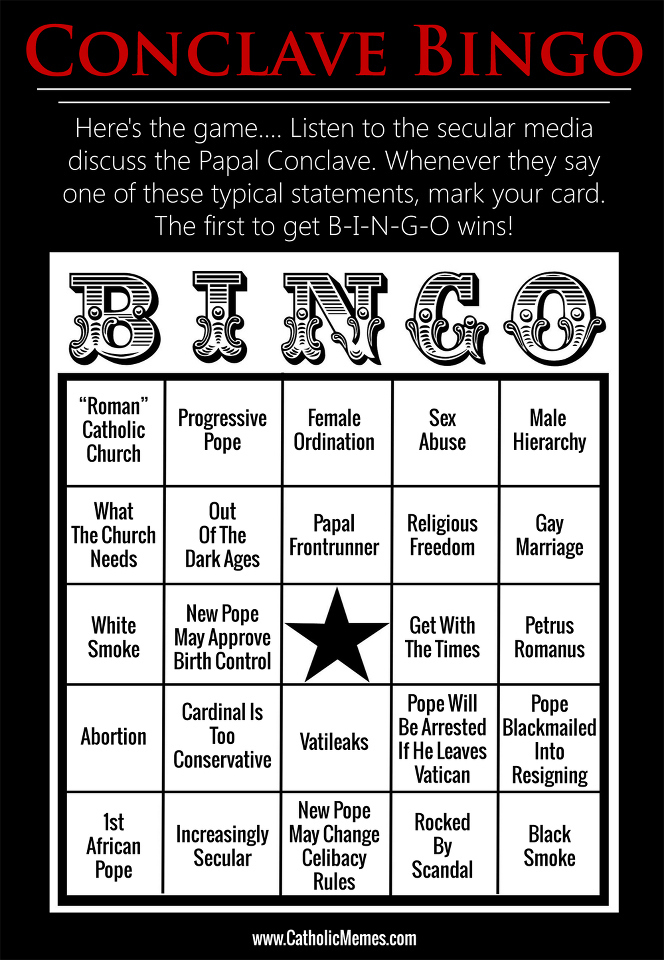1. Basic facts about the pope's role in the Catholic Church and the papal conclave process.
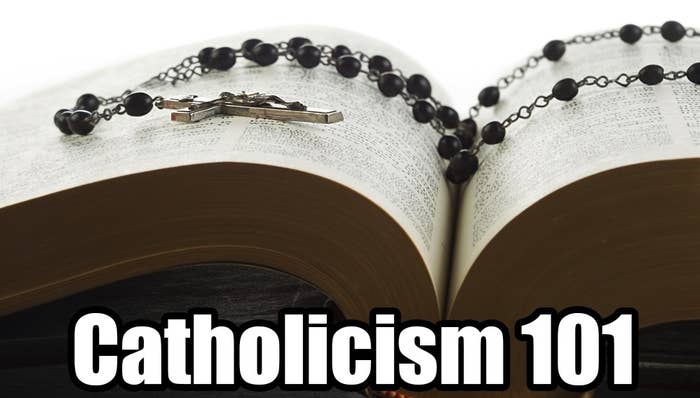
"And so I say to you, you are Peter, and upon this rock I will build my Church, and the gates of the netherworld shall not prevail against it." (Matthew 16:18)
Why is the pope important? Catholics believe that Jesus appointed St. Peter the head of the Catholic Church and thus gave him the authority to make decisions in order to preserve its sanctity and purity. There has been an unbroken succession of popes since Peter and Catholics believe that each pope has been Jesus Christ's representative on earth. As the Catechism of the Catholic Church states: "the pope enjoys, by divine institution, 'supreme, full, immediate, and universal power in the care of souls'" (CCC 937).
Is the pope divine? Do Catholics worship the pope? No and absolutely not. Catholics worship one God and one God alone; they definitely don't worship idols or a mere mortal like the pope. As Cardinal Dolan of New York explains on his blog, the pope "is the Successor of St. Peter, whom we believe Jesus appointed earthly pastor of His Church. And anyone familiar with St. Peter, as shown in the New Testament, knows that he was far from divine! In fact, our first Pope was a big sinner. He denied even knowing Jesus at the very time the Lord needed his friend Peter the most."
Who elects the pope? Those members of the College of Cardinals who were under the age of 80 on the day the Pope died or resigned, known as cardinal-electors. There are currently 207 cardinals. Ninety cardinals are not eligible to vote due to age and two cardinal-electors chose not to attend the conclave. Thus 115 cardinal-electors will choose the next pope. Papal candidates are referred to as papabile.
2. The "First African Pope" won't be elected at this conclave.
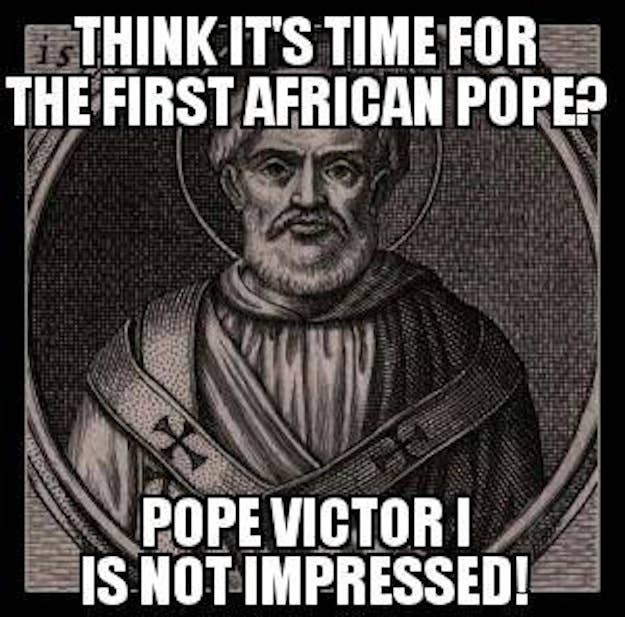
There have been three African popes in the history of the Catholic Church: Pope St. Victor I (188-199), Pope St. Miltiades (311-314), and Pope St. Gelasius I (492-496) were all born in the Roman province of Africa. Although the ancestry of these three men is unknown, there is evidence to suggest that they were not of Roman descent (meaning that they were dark-skinned). These church leaders played crucial roles in the early development of Christianity. For example, Pope Victor I set the liturgical date for Easter and made Latin the official language of the Church.
This doesn't mean that the election of the first African pope in recent history wouldn't be a newsworthy and significant moment for the Catholic Church. However, it would be disingenuous and just plain wrong to view such an event as the first time Africa and Africans have been "important" to the Church.
3. The Catholic Church is not dying.
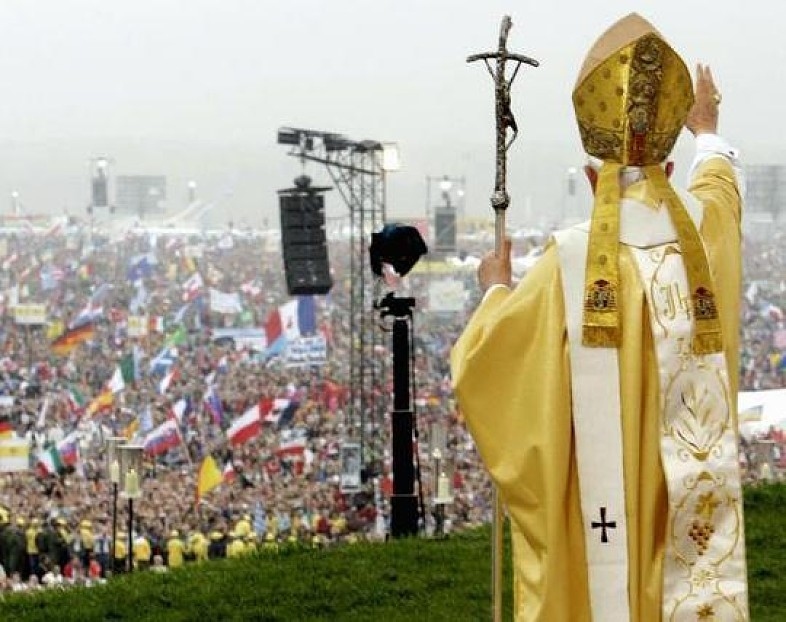
According to Vatican figures, there are 1.2 billion Catholics in the world. One in six inhabitants of Earth are Catholics. More men are entering the seminary in the past two years — American seminaries are at their fullest since the 1970s, and the number of priests is slowly beginning to increase worldwide.
The Catholic Church has survived much worse than the scandals, corruption, and internal problems that plague it today. "We tend to take the short view of history with a Church that has survived quite well into its third millennium," the Toronto Star's Rosie Dimanno writes. "Popes have been murdered, imprisoned and evicted. Dioceses have gone bankrupt, saints de-beatified and Christianity itself outlawed, not just in the distant past but in the modern world, where churches are torched and minority Christian communities persecuted."
"There has been no era in which the Church hasn't come under siege. Yet it endures and will continue to do so, on the resilience of faith and in the spirit of the martyrs."
4. The papal conclave is much more than an election — it's a holy process.
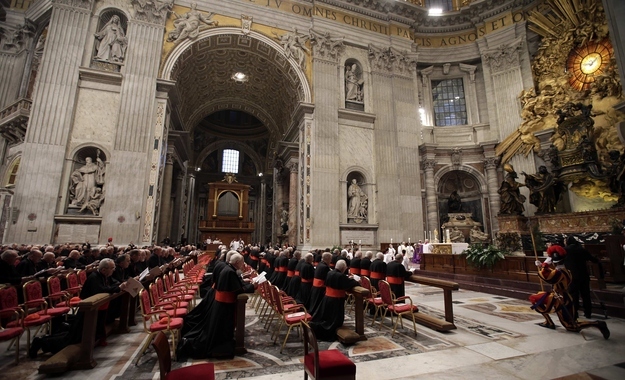
With all the chatter about papabile politics, front-runners, and secret gay cabals within the Vatican, it's easy to lose sight of the fact that the papal conclave is, above all else, a holy ritual of the Catholic Church. "A conclave is an act of God," Catholic University of America professor Fr. Kevin Irwin explains to the Catholic Register. "If it's an act of God you worship God...This is a prayer from the beginning to end. It's not about how to count your hanging chads."
Catholics believe that the Holy Spirit guides the cardinal-electors as they decide the next pope and the conclave begins with the cardinals chanting Veni, Sancte Spiritus, or "Come, Holy Spirit." It's important to note that Catholics don't believe the Holy Spirit chooses the pope; rather, they believe that the Spirit helps the voting cardinals as they determine what (who) will be best for the Church. The cardinal-electors may disagree on the best man for the job, but their votes are firmly based in their love of the Catholic Church and trust in the Holy Spirit. Indeed, rules of the conclave require each cardinal to say, "I call as my witness Christ the Lord who will be my judge, that my vote is given to the one who before God I think should be elected" as they cast their ballot.
5. The electors in the College of Cardinals are looking for an evangelizer, not a CEO.
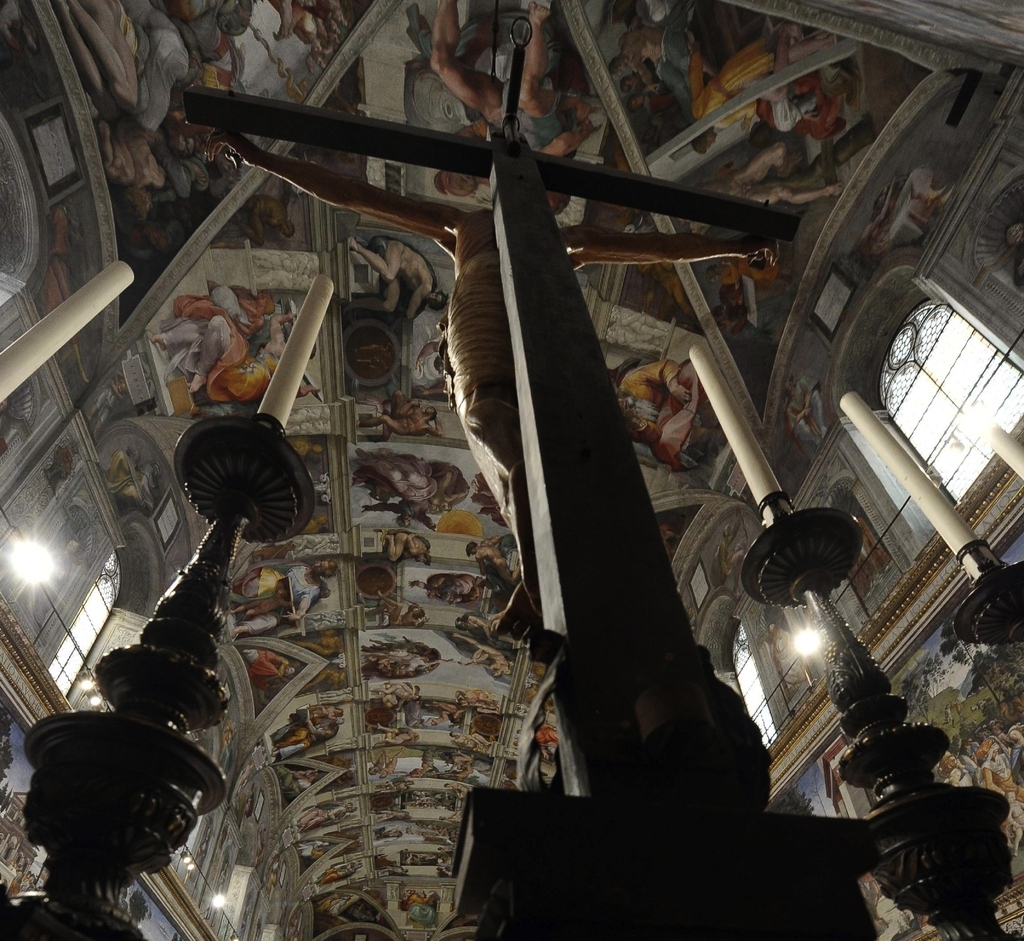
The first priority of the pope and the Church is to evangelize, to convey the Catholic message (and thus the message of Jesus) in an attractive and understandable manner. Cardinal-electors will value the ability to effectively preach the Gospel to an increasingly secular world more than bureaucratic and business savviness.
"The secular media wants to talk about 'What changes are going to be made?' and 'What's going to happen?" Father Kyle Schnippel, director of vocations for the Archdiocese of Cincinnati, explains to the Catholic Telegraph. "Those of us on the inside are going, well, 'The gospel is going to be proclaimed. That's what they're going to be looking for in how to continue what Benedict and John Paul (II) have established as the Church moves deeper into the third millennium."
6. The Pope does not have the power to make massive changes to the Catholic Church's moral doctrine.
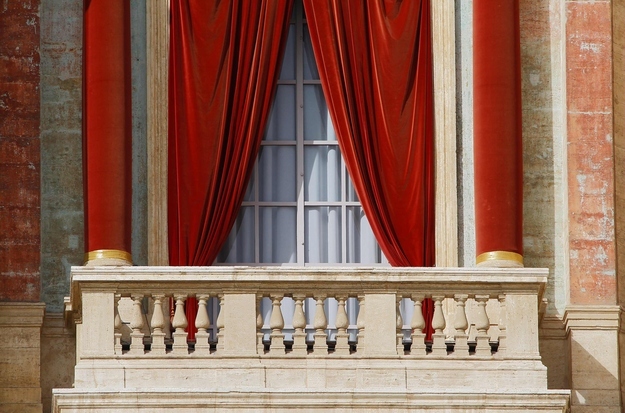
Despite the impression you may have received from talking heads on television, the next pope does not have the power to make sweeping changes to the moral teaching of the Catholic Church. As Cardinal Dolan of New York, one of the cardinal-electors currently locked in the Sistine Chapel, explains on his blog:
A common misperception is that a new Pope can "change doctrine." That, of course, is impossible. Catholicism is a revealed religion, meaning we believe that God has told us about Himself and about the meaning of life, primarily by sending us His Son as the "Word made flesh."
To preserve this truth, to "pass on" the faith to our children, is at the very essence of the Church, and the "job description" of the Pope. He cannot change the deposit of faith.
Some have the impression that we are electing a man who has a "platform," who can decide new "policies" for the Church. We are not.
Yes, a new Pope can develop fresh, new strategies to better, and more effectively, teach the doctrines of the faith. In fact, this is a big part of what we call the New Evangelization: to express the timeless truths of the faith – – especially the message and mystery of the Person who called himself the Truth, Jesus – – in a timely, radiant, more compelling way...
In other words, the how of our teaching can change; the what of it cannot.
7. The Church answers to a power much higher than the media and public opinion.

The Catholic Church has never and will never conform to the standards of a secular world. The Gospel doesn't change because society's morals have changed. The Church and its teachings have outlasted societies, governments, and empires by not bending to popular public opinion.
8. The Catholic Church doesn't hate gay people.
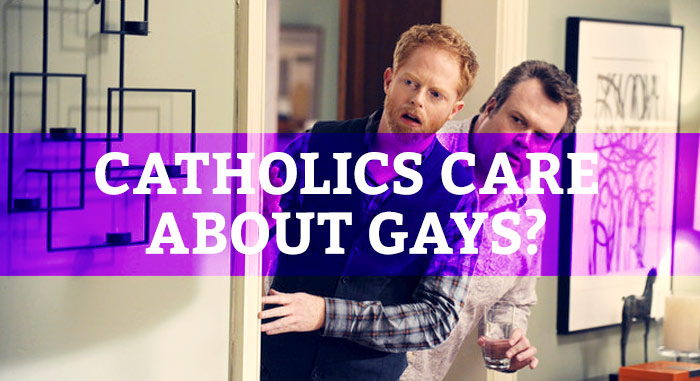
The teachings of the Church are straightforward: Sex is a fantastic gift of unity and procreation, which is appropriately placed within a loving, committed relationship in the Sacrament of Marriage, which is defined as a sacred union between a woman and a man. Both heterosexual and homosexual people are expected to live a life of virtue and chastity outside of marriage (since gay people can't get married within the Catholic Church, they are called to a lifetime of celibacy). Married couples are told that using artificial contraception, thereby rendering the "marital act infertile," is "intrinsically evil." In other words, the Church feels the same way about premarital heterosexual sex and contraceptive sex as it does about homosexual sex... They're all sins. It's important to note that being gay is not a sin, but engaging in homosexual activity is.
The Catechism of the Catholic Church acknowledges that homosexual people "do not choose their homosexual condition" and tells Catholics that gay men and women "must be accepted with respect, compassion, and sensitivity. Every sign of unjust discrimination in their regard should be avoided" (CCC 2358).
The United States Council of Catholic Bishops (USCCB) further clarified the Church's practical stance on homosexuality through a pastoral message written to parents of homosexual children in 1997, called "Always Our Children." The document helps devout parents come to terms with their child's sexuality, reassuring them, "Your [gay] child may need you and the family now more than ever. He or she is still the same person. This child, who has always been God's gift to you, may now be the cause of another gift: your family becoming more honest, respectful, and supportive."
"God does not love someone any less simply because he or she is homosexual," the landmark USCCB message states. "God loves every person as a unique individual. Sexual identity helps to define the unique persons we are, and one component of our sexual identity is sexual orientation. Thus, our total personhood is more encompassing than sexual orientation. Human beings see the appearance, but the Lord looks into the heart."
9. All Catholics are not Notre Dame fans, but they should be.
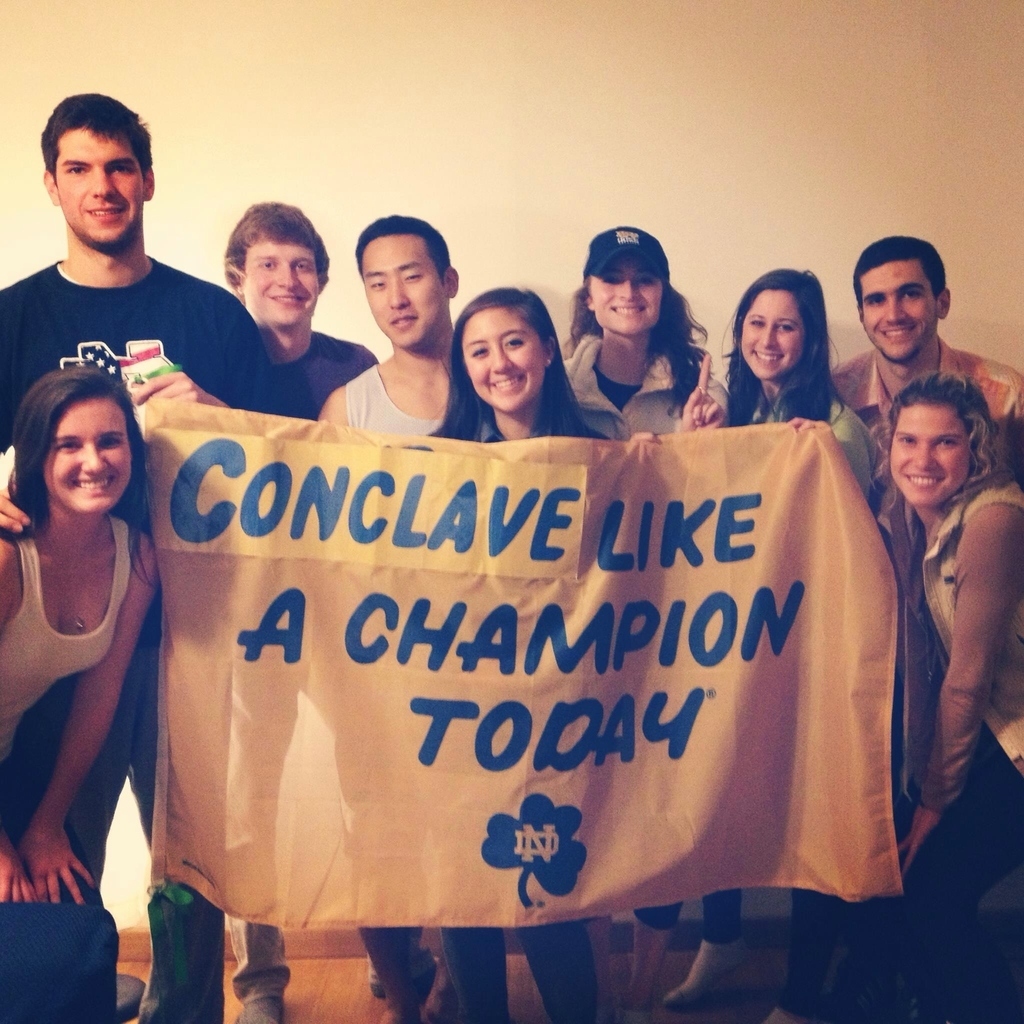
BONUS: Conclave Bingo! Catholics, play along at home as you watch the news on television.
